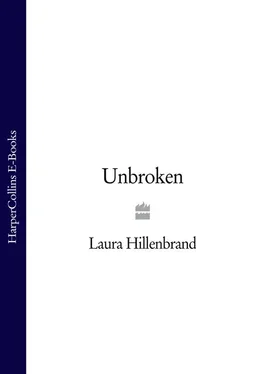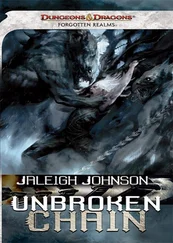Ahead, the Finns scuffed and sidled into Lash, roughing him up. Lash held his ground. But on the eighth lap, Salminen cocked his elbow and rammed it into Lash’s chest. Lash folded abruptly, in evident pain. The Finns bounded away. They entered the eleventh lap in a tight knot, looking to sweep the medals. Then, for an instant, they strayed too close to each other. Salminen’s leg clipped that of Höckert. As Höckert stumbled, Salminen fell heavily to the track. He rose, dazed, and resumed running. His race, like Lash’s, was lost.
Louie saw none of it. He passed the deflated Lash, but it meant little to him. He was tired. The Finns were small and distant, much too far away to catch. He found himself thinking of Pete, and of something that he had said as they had sat on their bed years earlier: A lifetime of glory is worth a moment of pain. Louie thought: Let go.
Nearing the finish line for the penultimate time, Louie fixed his eyes on the gleaming head of the pomaded competitor, who was many runners ahead. He began a dramatic acceleration. Around the turn and down the backstretch, Louie kicked, his legs reaching and pushing, his cleats biting the track, his speed dazzling. One by one, runners came up ahead and faded away behind. “All I had,” Louie would say, “I gave it.”
As Louie flew around the last bend, Höckert had already won, with Lehtinen behind him. Louie wasn’t watching them. He was chasing the glossy head, still distant. He heard a gathering roar and realized that the crowd had caught sight of his rally and was shouting him on. Even Hitler, who had been contorting himself in concert with the athletes, was watching him. Louie ran on, Pete’s words beating in his head, his whole body burning. The shining hair was far away, then nearer. Then it was so close that Louie again smelled the pomade. With the last of his strength, Louie threw himself over the line. He had made up fifty yards in the last lap and beaten his personal best time by more than eight seconds. His final time, 14:46.8, was by far the fastest 5,000 run by any American in 1936, almost twelve seconds faster than Lash’s best for the year. He had just missed seventh place.
As Louie bent, gasping, over his spent legs, he marveled at the kick that he had forced from his body. It had felt very, very fast. Two coaches hurried up, gaping at their stopwatches, on which they had clocked his final lap. Both watches showed precisely the same time.
In distance running in the 1930s, it was exceptionally rare for a man to run a last lap in one minute. This rule held even in the comparatively short hop of a mile: In the three fastest miles ever run, the winner’s final lap had been clocked at 61.2, 58.9, and 59.1 seconds, respectively. No lap in those three historic performances had been faster than 58.9. In the 5,000, well over three miles, turning a final lap in less than 70 seconds was a monumental feat. In his record-breaking 1932 Olympic 5,000, Lehtinen had spun his final lap in 69.2 seconds.
Louie had run his last lap in 56 seconds.
After cleaning himself up, Louie climbed into the stands. Nearby, Adolf Hitler sat in his box, among his entourage. Someone pointed out a cadaverous man near Hitler and told Louie that it was Joseph Goebbels, Hitler’s minister of propaganda. Louie had never heard of him. Pulling out his camera, he carried it to Goebbels and asked him if he’d snap a picture of the führer. Goebbels asked him his name and event, then took the camera, moved away, snapped a photo, spoke with Hitler, returned, and told Louie that the führer wanted to see him.
Louie was led into the führer’s section. Hitler bent from his box, smiled, and offered his hand. Louie, standing below, had to reach far up. Their fingers barely touched. Hitler said something in German. An interpreter translated.
“Ah, you’re the boy with the fast finish.”
Happy with his performance, Louie was itching to raise hell. He had hoped to pal around with Glenn Cunningham, but his hero proved too mature for him. Instead, he found a suitably irresponsible companion, donned his Olympic dress uniform, and descended on Berlin. The two prowled bars, wooed girls, chirped, “Heil Hitler!” at everyone in uniform, and stole anything Germanish that they could pry loose. In an automat, they discovered German beer. The serving size was a liter, which took Louie a good while to finish. Buzzing, they went walking, then circled back for another liter, which went down easier than the first.
Trolling around Berlin, they stopped across the street from the Reich Chancellery. A car pulled up and out stepped Hitler, who walked inside. Studying the building, Louie spotted a small Nazi flag near the doors. It would make a swell souvenir, and it looked easy to reach. The banner didn’t yet carry much symbolic meaning for him, or many other Americans, in the summer of ‘36. Louie just had a hankering to steal in his head and two persuasive liters of German brew in his belly.
Two guards paced the apron before the Chancellery. Watching them walk, Louie noted that on each pass, there was a point at which both had their backs to the flag. As the soldiers turned, Louie ran to the flag and immediately realized that it was much higher than he had thought. He began jumping in the air, trying to catch the edge of it. He became so absorbed in his task that he forgot about the guards, who ran toward him, shouting. Taking one last lunge for the flag, Louie snagged the edge and fell to the pavement, tearing the banner down with him, then scrambled to his feet and ran like mad.
He heard a crack! Behind him, a guard was running at him, his gun pointed at the sky, yelling, “Halten Sie!” That much Louie understood. He stopped. The guard grabbed his shoulder, spun him around, saw his Olympic uniform, and hesitated. He asked Louie his name. The one thing that Louie knew about Nazis was that they were anti-Semitic, so when he gave his name, he delivered it in an exaggeratedly Italian fashion, rolling the r, he would say, “for about two minutes.”
The guards conferred, went inside, and came out with someone who looked more important than they. The new German asked him why he had stolen the flag. Louie, laying it on thick, replied that he wanted a souvenir of the happy time he had had in beautiful Germany. The Germans gave him the flag and let him go.
When the press got wind of Louie’s adventure, reporters took creative liberties. Louie had “stormed Hitler’s palace” to steal the flag in a hail of gunfire that had “whistled around his head.” Plunging “eighteen feet,” he had raced away, pursued by “two columns” of armed guards, who had tackled and beat him. Just as a German rifle butt had been about to crush Louie’s head, the German army’s commander in chief had halted the attack, and Louie had talked the general into sparing his life. In one version, Hitler himself had allowed him to keep the flag. In another, Louie had concealed the flag so cleverly that it was never discovered. He had done it all, went the story, to win the heart of a girl.
On August 11, Louie packed his belongings, the flag, and an array of other stolen Teutonica and left his room in the Olympic Village. The Games were winding down, and the track athletes were leaving early to compete in meets in England and Scotland. A few days later, fireworks brought the Games to a booming close. Hitler’s show had gone without a hitch. The world was full of praise.
The American basketball player Frank Lubin lingered in Berlin for a few days. His German hosts had invited him out to dinner, so they cruised the streets in search of a restaurant. A pretty place caught Lubin’s eye
it, his hosts balked: a Star of David hung in the window. To be seen there, they said, “might prove harmful to us.” The group found a gentile restaurant, then visited a public swimming pool. As they walked in, Lubin saw a sign reading JUDEN VERBOTEN. The sign hadn’t been there during the Games. All over Berlin, such signs were reappearing, and the Nazis’ virulently anti-Semitic Der Stürmer, nowhere to be seen during the Games, was back on newsstands. Lubin had won a gold medal in Berlin, but when he left, he felt only relief. Something terrible was coming.
Читать дальше












